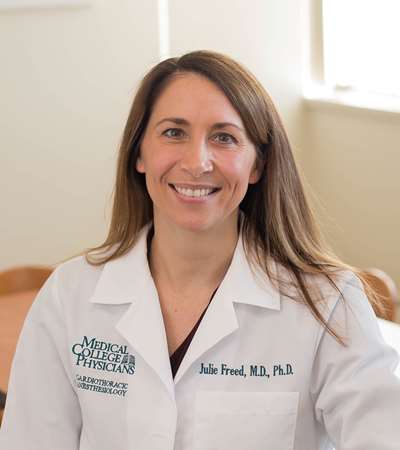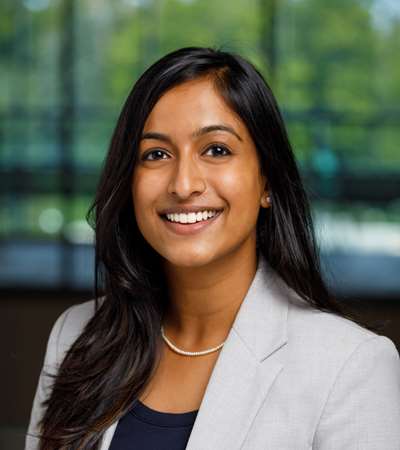
Physician Scientists are uniquely positioned to bridge scientific discovery and clinical care. As such, our training involves learning clinical skills, understanding how to design and test hypotheses, as well as mastering the art of writing and presenting our findings. While these are crucial for developing our clinical-care skills and research acumen, there are innumerous other professional opportunities that physician scientists often partake in, including national or institutional leadership, medical/graduate education, outreach and mentorship, policy/advocacy, industrial consulting, and entrepreneurship. As such, training MD-PhD students often requires a personalized approach that empowers them to gain the skills necessary for their unique career interests.
In this mentor spotlight, I’d like to share how Dr. Julie K Freed, my PhD mentor, has personalized my MD-PhD training and truly emphasized the importance of developing well-rounded skills in the business of research, leadership, communication, and mentorship. I hope her approach and the examples described below help inform training/mentorship opportunities for MD-PhD students – especially those interested in surgeon scientist careers.
Translational Research: From Bench to Bedside
Dr. Freed is a Cardiac Anesthesiologist, and she leads a Tissue Bank that allows us to collect discarded surgical specimens from patients for research purposes. Through this, I was able to design an entire project that utilized human arterioles from patients with and without coronary artery disease and discovered translationally important mechanisms that influence human microvascular (dys)function. Based on these findings, we were able to start clinical trials.
Importantly, throughout my PhD, I was able to learn the nuances of organizing and expanding a tissue bank, securing buy-in from surgeons and surgical staff, and maintaining relationships with preoperative clinical staff. As an aspiring surgeon-scientist, understanding the “business” side of conducting translational research in collaboration with the surgical staff has been an invaluable learning opportunity. In addition, I was able to learn how our findings in the lab can inform the design and development of clinical trials, and a key part of this was working with regulatory offices. These are aspects of research that I was not exposed to prior to working with Dr. Freed, but have been incredibly informative given my interest in hopefully translating my future work to patient care.
Involvement with National Societies and Leadership
When I first met Dr. Freed, I was incredibly impressed by her involvement in national societies and committees (both Anesthesia and Physiology-related) through which she was able to influence policies and programming at conferences and advocate for the importance of supporting translational research. During our first few meetings, she drafted an individual development plan with me and included involvement in committees both locally and nationally as part of that plan – an opportunity that I did not know was available for trainees. Frankly, I didn’t fully understand the importance or utility of trainee involvement with such committees either.
After she nominated me and I was selected, I soon discovered I had an invaluable seat at a table that determined trainee education, programming, and overall experiences. Through these positions, I was able to influence practical change and solutions to the problems that many of my colleagues experienced. Professionally, these involvements also taught me important lessons in leadership, speaking up respectfully, and establishing and maintaining connections nationally – all of which are crucial skills for a physician scientist.
Addressing and Overcoming Common Challenges Faced by Female Physician Scientists
The unique challenges faced by female physician scientists are innumerous but are often grounded in the persistence of non-inclusive policies that hinder balancing family life and biased perception of female scientists. Dr. Freed has been proactive about encouraging my involvement with local and national programming that promotes and empowers women in science. More importantly, she created a safe space for having conversations about many of these issues – by asking about my well-being or experiences at events during each of our weekly meetings and sharing challenges in her career as well as how she addressed them. These conversations were especially important when considering how best to balance familial goals, surgical residency training, and research productivity.
Often times female trainees need to bring up these topics or issues before mentors address them, however, that is not always comfortable as we often do not know who supports such discussions. As such, Dr. Freed’s openness and proactive approach was greatly empowering.
Learning to Present Research Findings to a Broad Audience
All PhD students are taught how to present research findings through posters and podium presentations. These are commonly presented to other experts in their field, and as such are highly scientific and technical. However, physician scientists often work in interdisciplinary environments and must present their work to clinicians, collaborators, or even patients. As such, Dr. Freed has emphasized presentation strategies that break down complex topics, emphasize findings and conclusions in simplistic terms, and highlight the implications of our work for patient care. She also encouraged me to present to broad audiences throughout my training to practice these skills and learn to address a wide variety of questions that are important to different audiences.
Mentoring Undergraduate/Medical Students through Research Projects
I am passionate about mentoring and supporting the future generation of physician scientists and specifically providing opportunities for students from smaller institutions to explore medical research. Our institution does not have an associated undergraduate program, so Dr. Freed enrolled our lab in numerous undergraduate-research pipeline programs. Through these programs, I have had undergraduate trainees throughout my PhD years. Not only did Dr. Freed’s initiative provide an incredibly fulfilling training environment, but also taught me important skills in teaching students various aspects of being a researcher. Physician scientists often mentor students through research, both in the clinical and lab settings, and such, MD-PhD trainees should be given the opportunity to develop and improve their mentoring and teaching skills.

Gopika SenthilKumar is a G3 (5th year) in the MD-PhD program at the Medical College of Wisconsin in Milwaukee and is the Vice Chair for the AWS National Medical Student Committee 23’-24’. She is currently pursuing her PhD in Dr. Julie K Freed's lab and studies how estrogen and sphingolipid signaling influence microvascular function. She is a predoctoral fellow of the American Heart Association. In her free time, Gopika enjoys trying local restaurants, painting, and working out with friends!

